 Dr. Marc RodgerOver 750,000 Canadians will have an unexplained vein blood clot in their lifetime, known as venous thrombosis. Deciding whether these people should take blood thinners for the rest of their lives requires knowledge of the long-term risks and consequences of a second vein blood clot if treatment is stopped. A collaborative study led by Dr. Marc Rodger and Faizan Khan now provides the best data yet on the long-term risks and consequences of recurrent clots. The research team combined data from 18 relevant studies involving 7,515 patients. They found that the risk of a second clot after stopping blood thinners is substantial, reaching 10% in the first year and 36% at 10 years. Four percent of those recurrent blood clots caused death.
Dr. Marc RodgerOver 750,000 Canadians will have an unexplained vein blood clot in their lifetime, known as venous thrombosis. Deciding whether these people should take blood thinners for the rest of their lives requires knowledge of the long-term risks and consequences of a second vein blood clot if treatment is stopped. A collaborative study led by Dr. Marc Rodger and Faizan Khan now provides the best data yet on the long-term risks and consequences of recurrent clots. The research team combined data from 18 relevant studies involving 7,515 patients. They found that the risk of a second clot after stopping blood thinners is substantial, reaching 10% in the first year and 36% at 10 years. Four percent of those recurrent blood clots caused death.
“We also found that men were at higher risk of a second vein blood clot than women, emphasizing the importance of considering sex when deciding which patients should take blood thinners for life,” said Faizan Khan, a PhD student at the University of Ottawa and the Ottawa Hospital Research Institute.
The findings, published in The BMJ, will inform clinical practice guidelines and help healthcare providers and patients weigh the risk of recurrent clots against current estimates for the risk of bleeding from continuing treatment. See accompanying editorial.
“We see two to three people with unexplained blood clots every day at The Ottawa Hospital. Now we have the best data yet on their long-term risk of another clot, which will help us counsel patients and guide the duration of treatment,” said Dr. Rodger, senior scientist and thrombosis specialist at The Ottawa Hospital and professor at the University of Ottawa. Faizan Khan
Faizan Khan
Authors: Faizan Khan, Alvi Rahman, Marc Carrier, Clive Kearon, Jeffrey I. Weitz, Sam Schulman, Francis Couturaud, Sabine Eichinger, Paul A. Kyrle, Cecilia Becattini, Giancarlo Agnelli, Timothy A. Brighton, Anthonie W.A. Lensing, Martin H. Prins, Elham Sabri, Brian Hutton, Laurent Pinede, Mary Cushman, Gualtiero Palareti, George A. Wells, Paolo Prandoni, Harry R. Büller, Marc A. Rodger, for the MARVELOUS Collaborators
Source: The BMJ
Funding: This study was funded by the Canadian Institutes of Health Research and the Heart and Stroke Foundation. Research at The Ottawa Hospital is possible thanks to generous donations to The Ottawa Hospital Foundation.
The Ottawa Hospital: Inspired by research. Driven by compassion
The Ottawa Hospital is one of Canada’s largest learning and research hospitals with over 1,100 beds, approximately 12,000 staff and an annual budget of over $1.2 billion. Our focus on research and learning helps us develop new and innovative ways to treat patients and improve care. As a multi-campus hospital, affiliated with the University of Ottawa, we deliver specialized care to the Eastern Ontario region, but our techniques and research discoveries are adopted around the world. We engage the community at all levels to support our vision for better patient care. See www.ohri.ca for more information about research at The Ottawa Hospital.
University of Ottawa: —A crossroads of cultures and ideas
The University of Ottawa is home to over 50,000 students, faculty and staff, who live, work and study in both French and English. Our campus is a crossroads of cultures and ideas, where bold minds come together to inspire game-changing ideas. We are one of Canada’s top 10 research universities—our professors and researchers explore new approaches to today’s challenges. One of a handful of Canadian universities ranked among the top 200 in the world, we attract exceptional thinkers and welcome diverse perspectives from across the globe. www.uottawa.ca
Media Contact
Amelia Buchanan
Senior Communication Specialist
Ottawa Hospital Research Institute
Office: 613-798-5555 x 73687
Cell: 613-297-8315
ambuchanan@ohri.ca
